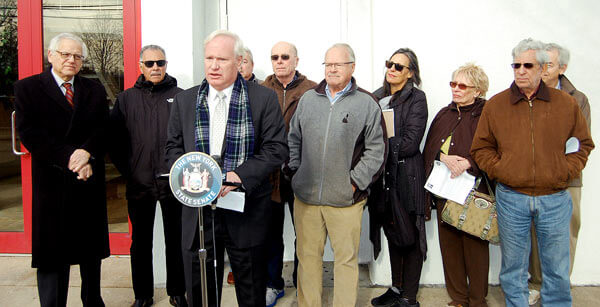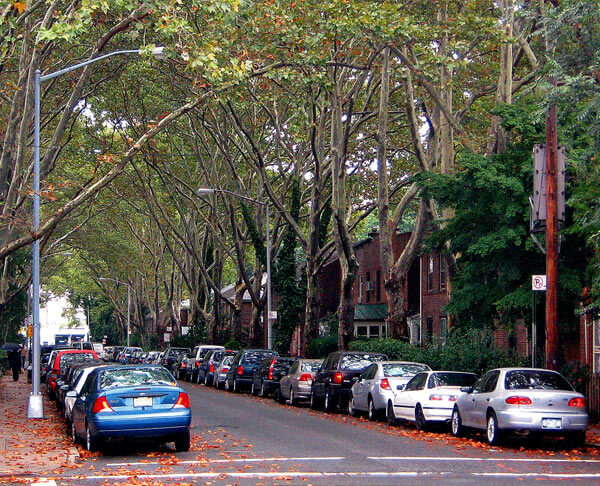By Sarina Trangle
State Sen. Tony Avella (D-Bayside) has introduced legislation that would compel the city to enforce restrictive covenants alongside zoning ordinances.
The bill would permit homeowners and neighborhood organizations to register properties subject to restrictive covenants or other deed stipulations governing design and development with the city Department of Buildings. The department would then check a registry of such restrictions before issuing building permits. Avella, who served in the City Council for two terms, said the DOB would be charged with enforcing covenants under his legislation.
“They would be responsible for enforcement, just like with zoning ordinances,” Avella said. “Why should private citizens have to pay exorbitant amounts to enforce it?”
The DOB did not respond to several requests for comment.
Paul Graziano, an urban planning and historic preservation consultant, said covenants emerged after the Norman invasion of England with English common law. In the United States, developers began tying clauses stipulating how development should proceed in deeds in an effort to ensure that communities retain their character. When municipal zoning was developed later, the restrictive covenants maintained their legal jurisdiction, but were not enforced by the city like zoning ordinances.
If builders do not abide by covenants, neighborhood associations have been successfully taking them to court. But legal fees often cost at least $50,000 and can be as high as $200,000, Graziano said.
“Developers come in with guns loaded and tons of money,” he said. “These guys have the money to just wait you out if you’re a homeowners association.”
But if a community allows too many exceptions in its neighborhoods, Graziano said it is much more difficult to prove a covenant is still relevant.
Covenants, established by the Rickert Finlay Co. when it developed Bellcourt, between Bell Boulevard and the Clearview Expressway and 35th and 39th avenues, and parts of Flushing, Douglaston and Little Neck in the early 1900s, prevent the construction of walls or fences within 20 feet of the property lines and streets, prohibit flat roofs and mandate minimum lot sizes and construction costs for homes, Graziano said.
The restriction covers about 500 properties overseen by the Broadway-Flushing Homeowners Association, more than 300 under the Westmoreland Association in Little Neck and close to 600 involved with the Douglas Manor Association, according to a joint memo the associations sent to Council candidates this fall. The covenant also applies to more than 500 properties in the Station Road section of Auburndale.
Douglas Manor is landmarked, which gives its association more control over development.
Graziano said more strict covenants guide construction in Bayside Gables and Forest Hill Gardens, where a private corporation run by the neighborhood has the authority to approve or disprove any development in its jurisdiction based on design.
After the Man family developed Richmond Hill, it transformed the golf course into the neighborhood known today as Kew Gardens. Residual covenants limiting setbacks for houses and fences and minimum lot sizes govern construction in Richmond Hill Terrace, north of Hillside Avenue from 106th Street to Lefferts Boulevard, the Kew-Forest neighborhood and several parts of Kew Gardens, Graziano said.
Van Court, in Forest Hills, has similar restrictions, Graziano said.
Van Close and Arbor Close, which include Forest Hills rowhouses on Austin Street each bordering a central commonly owned green space, have a covenant stipulating that the residents jointly own the garden areas and protecting the buildings’ architecture.
Similarly, Sunnyside Gardens has a covenant ensuring residents control courtyards between rowhouses and Beech Court in College Point has such a restriction staking out homeowners own a green spaces.
Janet McCreesh, president of the Broadway-Flushing Homeowners Association, said violations have grown so frequent that the association encounters one about once a month.
“The Department of Buildings is a government agency. People listen to them,” she said. “We ring the bell. We send letters. Some immediately understand and they look around and see that nobody else has a fence …. Some don’t want to know. They continue with it. Then we have to use our lawyers.”
The Broadway-Flushing Homeowners Association won two cases this summer: One victory gave the organization the authority to prevent a homeowner from building a wall that violated an open space requirement, and the second forbids a new owner from dividing a lot into two subdivisions with one home apiece.
Graziano said he was accustomed to seeing five to 10 disputes over covenants head to court every year in Queens.
Walter Mugdan, president of the Westmoreland Association, said he was aware of three to four lawsuits in the organization’s 90-year-history.
“It’s about once a generation,” he said. “We try to avoid them. They’re incredibly time consuming and expensive. But we win.”
Mugdan said the last major trial, in the late ’80s, would have cost the association at least $150,000, but the organization was only able to pay half the fees. It also had attorneys from the neighborhood donate their time.
Avella introduced a similar bill when he was in the City Council, where he served two terms. He said it failed becuase real estate developers held too much sway over the City Council.
Now, a state legislator, Avella said he is trying the bill in Albany, where he believes the industry lobby is weaker.
“At the very least, it brings the issue up again, and maybe with a new administration they might be a little more forward thinking,” he said.
Reach reporter Sarina Trangle at 718-260-4546 or by e-mail at strangle@cnglocal.com.



































